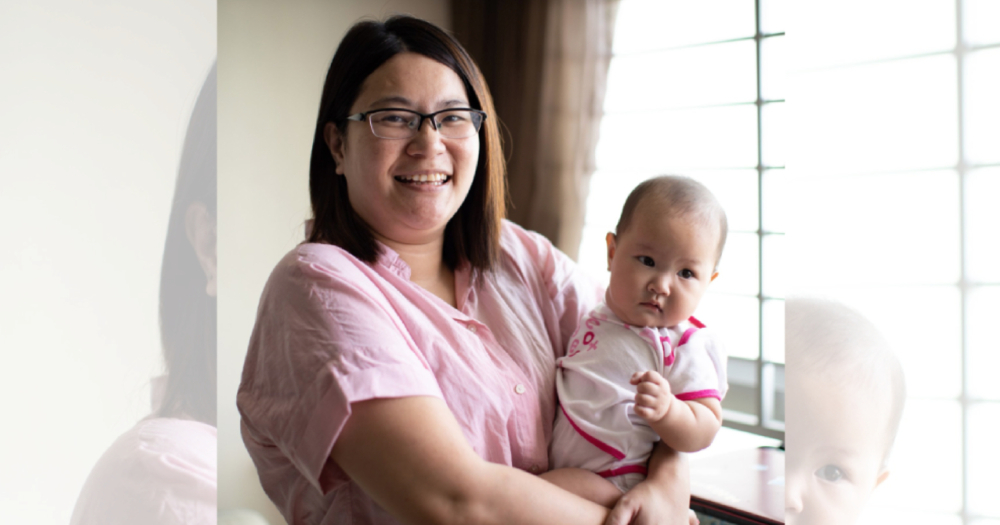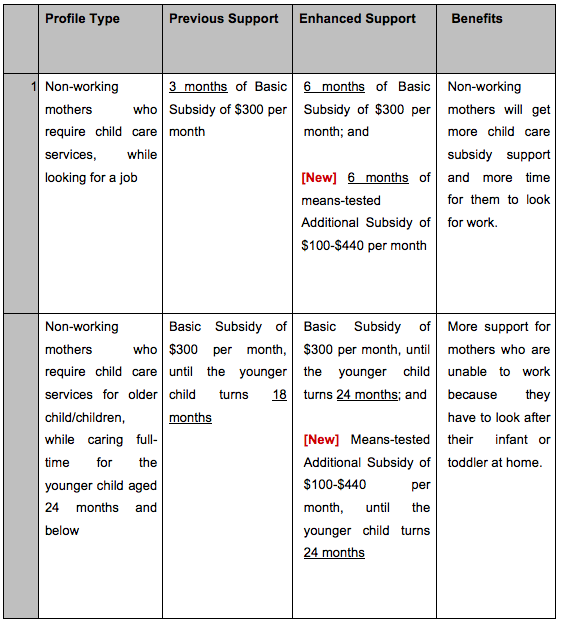Sally Lee left her job in admin and customer service to focus on raising her children -- a six-year-old son, who attends child care, and a six-month-old daughter.
Although the amount varies, she and her marine engineer husband typically spend more than S$2,000 a month on their children, a portion of which is spent on their son’s child care fees, which cost $743 a month before subsidies.
With subsidies, preschool is largely affordable in Singapore, especially in government-supported preschools.
Subsidies help parents like Lee have peace of mind
To help with their monthly preschool expenses, the family would receive some subsidies from the Early Childhood Development Agency (ECDA).
Now, the Lees will receive more subsidies for a longer period of time.
These subsidies go into reducing the amount of money they pay for their son's child care fees. The added certainty that they will continue to receive these subsidies until their daughter turns 2 years old, also provides greater peace of mind.
Lee told the Ministry of Social and Family Development (MSF):
"My children are my everything.
As a mother, I recognised that the early years are important in my children's development, so I made the conscious decision to put a hold on my career to care full time for them…
I do what I can to give my children the best, but sometimes, this adds to our expenses.
These everyday expenses can put pressure on my husband as the sole breadwinner of our family."
Lee hopes to return to the workforce after her daughter is older and can be put in child care.
Her family is one of the some 5,000 households expected to benefit from enhanced child care subsidy support from ECDA.
ECDA announced the changes to existing child care subsidies on March 6, 2019, as part of an ongoing review of preschool subsidy schemes and processes.
The changes, which took effect from March 1, 2019, are as follows.
More subsidies for non-working mothers upon Special Approval
Non-working mothers seeking employment
Non-working mothers seeking employment are now eligible upon Special Approval to receive the Basic Subsidy of $300 and $600 a month for child and infant care for six months.
Previously, those who were granted Special Approval received a Basic Subsidy of $150 a month for three months.
Mothers whose household incomes of $7,500 and below are also now eligible to receive an Additional Subsidy of up to $440 and up to $540 a month for child and infant care respectively for six months, depending on their monthly household income.
Non-working mothers caring full-time for a younger child
For mothers who need child care for their older child(ren) but are not working because they are caring full-time for a younger child, they may be granted Special Approval to receive a Basic Subsidy of $300 a month for child care for their older child until their younger child turns two years old.
Previously, it was up till the younger child turns 18 months.
Again, mothers with household incomes of $7,500 and below may now be eligible for an Additional Subsidy of up to $440 for child care for their older child, until their younger child turns two.
Here's the information on child care subsidy enhancements laid out in a nifty table:
Non-working mothers who are neither seeking employment nor caring full-time for a younger child
Non-working mothers continue to receive $150 in Basic Subsidy per month.
Those who are unable to work due to medical reasons or full-time caregiving commitments may also apply to ECDA for higher subsidy support under Special Approval.
How about single parents?
Single parents qualify for all of the above subsidies too.
Why provide the enhanced child care subsidy to non-working mothers?
This is to help families with their preschool expenses, and provide better support for mothers who are unable to work but need child care.
It also gives non-working mothers a "greater peace of mind to secure a job", said Senior Parliamentary Secretary for Social and Family Development Associate Professor Faishal Ibrahim on March 6 during his ministry’s Committee of Supply debate.
How about working mothers?
Working mothers, deemed to be those who work at least 56 hours a month (about two days a week), will continue to enjoy a Basic Subsidy of $300 and Additional Subsidy of up to $440 and up to $540 for child and infant care respectively, depending on their monthly household income.
Greater certainty for parents receiving subsidies
Previously, ECDA validated the working status of mothers on a yearly basis, to review and update the subsidies that preschool children receive.
Now, the review of the mothers' working status and their household incomes will be done at the following fixed points of assessment:
- When the child is enrolled in preschool
- When there's a change in programme (for instance, from infant to child care), and
- At the end of Nursery 2, or when the child turns four
Should there be a change in household income, parents who may be eligible for more subsidies can apply for a review at any time too.
What does this mean for parents? They will have more certainty on how much subsidies they will receive, even as they transit between jobs or take on caregiving responsibilities.
Much easier subsidy application
ECDA will introduce an enhanced form to be rolled out with the new Centre Management System (CMS) to preschools to preschools this year.
Parents can expect more streamlined and easier applications for subsidy and financial assistance.
Instead of the current three, parents will only need to fill in one form to apply for the various subsidies and financial assistance available.
The CMS will also benefit preschools as they will no longer need to retain copies of birth certificates and NRICs for subsidy applications.
Administrative processes such as license application and enrolment will then be simpler and shorter.
Faishal said this will "smoothen the application process" for around 20,000 new families each year, and reduce the time spent on subsidy application.
ECDA plans to roll out the system to all pre-schools later this year.
Top image via MSF Singapore’s Facebook page
This sponsored post by the Ministry of Social and Family Development made the writer realise that while it’s not easy being a parent, help is available to make things easier.
If you like what you read, follow us on Facebook, Instagram, Twitter and Telegram to get the latest updates.

